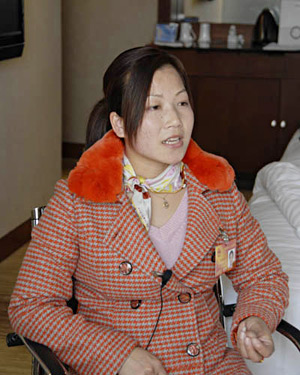|
 |
|
ROLE MODEL: Yang Xiaoxia, the country's first migrant worker legislator, discusses her suggestions to better serve migrant workers (XU BEI) |
A new residence permit system that offers more flexibility and equal access to social services should be adopted to better serve migrant workers, a legislator recently suggested.
Yang Xiaoxia, a deputy to the National People's Congress (NPC), China's top legislature, spoke with Beijing Review during the ongoing Third Session of the 11th NPC in Beijing.
Born in 1981 in rural Jiangxi Province, Yang has worked in Ningbo City in coastal Zhejiang Province, some 450 km away from home, for more than 10 years. In 2006, she was named one of the top 10 migrant workers in Ningbo.
On August 16, 2007, Yang, a quality inspector from Veken Elite Co. Ltd., together with six other migrant workers, was granted a Ningbo residence certificate, becoming the city's first batch of migrant residents.
Later, in July 2009, the city launched its Interim Measures on Landed Permanent Residence Based on Points for Migrant Workers in Ningbo. The program was the first of its kind in the country, offering urban residence for blue-collar rural workers, for whom obtaining residence permits is one of the greatest obstacles when seeking jobs in urban areas. The pilot scheme was concluded in January 2010 as three migrant workers in addition to Yang and the six others managed to obtain Ningbo residence permits.
According to the measures, the program is open to healthy migrant workers under 45 years old who have worked full-time at the same company in Ningbo for at least five years and received social insurance benefits for at least five years. Candidates who apply must earn at least 100 out of 150 points to be eligible.
It is a very important program which could attract high-quality migrant workers, help meet the city's development needs, and provide talent for the city's transformation in terms of economy and society, the Ningbo government's website stated.
However, the yearly assessment process is rigorous. In the assessment held in November last year, only 10 applicants out of 2,500 became qualified candidates— the assessment awards bonus points for workers with technology patents or senior professional job titles, which few migrant workers have. Nevertheless, it is widely considered a feasible and reliable trial program.
"Having a stable job and settling down in the city are the most widely shared concerns among millions of migrant workers, including myself," said Yang, who was selected as an NPC deputy in January 2008, the first legislator among the 10 million migrant workers in Zhejiang. "No one wants to become a drifter."
Currently, the largest labor force in China consists of migrant workers who were born after 1980, better known as the new-generation migrant workers. Compared with the previous generation, they have a higher education level and more open minds.
"They are eager to become part of the cities where they are now living," Yang said.
Yang said on the one hand, reform of the current residence permit system is necessary to offer new-generation migrant workers more opportunities to settle down. On the other hand, more measures should be taken to ensure that migrant workers have the same access to social services as urban residents.
"I hope that the residence permit system in Ningbo will be promoted and applied in other places across the country, helping more migrant workers find a sense of belonging in the cities," Yang said. "That's what they pursue." | 